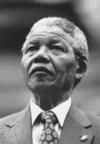- Mandela, Nelson
-
South African black nationalist leader and statesman.The son of a Xhosa chief, Mandela studied law at the University of Witwatersrand and in 1944 joined the African National Congress (ANC). After the Sharpeville massacre (1960), he abandoned his nonviolent stance and helped found the "Spear of the Nation," the ANC's military wing. Arrested in 1962, he was sentenced to life imprisonment. He retained wide support among South Africa's black population and became an international cause célèbre. Released by Pres. F.W. de Klerk in 1990, he replaced Oliver Tambo as president of the ANC in 1991. In 1993 Mandela and de Klerk were awarded the Nobel Peace Prize for their efforts to end apartheid and bring about the transition to nonracial democracy. In 1994 he was elected president in the country's first universal suffrage elections; by the time he stepped down in 1999, Mandela was the most universally respected figure of postcolonial Africa.
 Nelson Mandela, 1990.© Christopher Morris/Black Star
Nelson Mandela, 1990.© Christopher Morris/Black Star* * *
▪ president of South Africaborn July 18, 1918, Umtata, Cape of Good Hope, S.Af.South African black nationalist and statesman whose long imprisonment (1962–90) and subsequent ascension to the presidency (1994) symbolized the aspirations of South Africa's black majority. He led the country until 1999.The son of Chief Henry Mandela of the Xhosa-speaking Tembu people, Nelson Mandela renounced his claim to the chieftainship to become a lawyer. He attended the University College of Fort Hare and studied law at the University of Witwatersrand; he later passed the qualification exam to become a lawyer and in 1952 opened a firm with Oliver Tambo (Tambo, Oliver). In 1944 he joined the African National Congress (ANC), a black-liberation group, and in 1949 became one of its leaders, helping to revitalize the organization and opposing the apartheid policies of the ruling National Party. Mandela went on trial for treason in 1956–61 but was acquitted. During the extended court proceedings he divorced his first wife and married Nomzamo Winifred Madikizela (Winnie Madikizela-Mandela (Madikizela-Mandela, Winnie)); they divorced in 1996. After the massacre of unarmed Africans by police forces at Sharpeville in 1960 and the subsequent banning of the ANC, Mandela abandoned his nonviolent stance and began advocating acts of sabotage against the South African regime. In 1962 he was jailed and sentenced to five years in prison.In 1963 the imprisoned Mandela and several other men were tried for sabotage, treason, and violent conspiracy in the celebrated Rivonia Trial, named after a fashionable suburb of Johannesburg where raiding police had discovered quantities of arms and equipment at the headquarters of the underground Umkhonto We Sizwe (“Spear of the Nation,” the ANC's military wing). Mandela had been a founder of the organization and admitted the truth of some of the charges that were made against him. On June 12, 1964, he was sentenced to life imprisonment.From 1964 to 1982 Mandela was incarcerated at Robben Island Prison, off Cape Town. He was subsequently kept at the maximum-security Pollsmoor Prison until 1988, at which time he was hospitalized for tuberculosis. Mandela retained wide support among South Africa's black population, and his imprisonment became a cause célèbre among the international community that condemned apartheid. The South African government under President F.W. de Klerk (de Klerk, F.W.) released Mandela from prison on February 11, 1990. On March 2 Mandela was chosen deputy president of the ANC (the president, Tambo, being ill), and he replaced Tambo as president in July 1991. Mandela and de Klerk worked to end apartheid and bring about a peaceful transition to nonracial democracy in South Africa. In 1993 they were awarded the Nobel Prize for Peace for their efforts.In April 1994 South Africa held its first all-race elections, which were won by Mandela and the ANC. As president, he established the Truth and Reconciliation Commission (TRC), which investigated human rights violations under apartheid, and introduced housing, education, and economic development initiatives designed to improve the living standards of the country's black population. In 1996 he oversaw the enactment of a new democratic constitution. The following year Mandela resigned his post with the ANC and in 1999 did not seek a second term as South African president. After leaving office in June, he retired from active politics.Mandela's writings and speeches were collected in No Easy Walk to Freedom (1965) and I Am Prepared to Die, 4th rev. ed. (1979). His autobiography, Long Walk to Freedom, was published in 1994.Additional ReadingMary Benson, Nelson Mandela (1986, reissued with additions, 1994); Fatima Meer, Higher Than Hope (1988, reprinted 1990).* * *
Universalium. 2010.
